February 2025
The global post-traumatic stress disorder treatment market size accounted for USD 2.28 billion in 2024, grew to USD 2.37 billion in 2025 and is expected to be worth around USD 3.42 billion by 2034, registering a CAGR of 4.14% between 2024 and 2034. The North America post-traumatic stress disorder treatment market size is calculated at USD 1.32 billion in 2024 and is expected to grow at a CAGR of 4.21% during the forecast year.
The global post-traumatic stress disorder treatment market size is calculated at USD 2.28 billion in 2024 and is predicted to reach around USD 3.42 billion by 2034, expanding at a CAGR of 4.14% from 2024 to 2034. The post-traumatic stress disorder treatment market is driven by the growing understanding and acceptance of mental health issues.
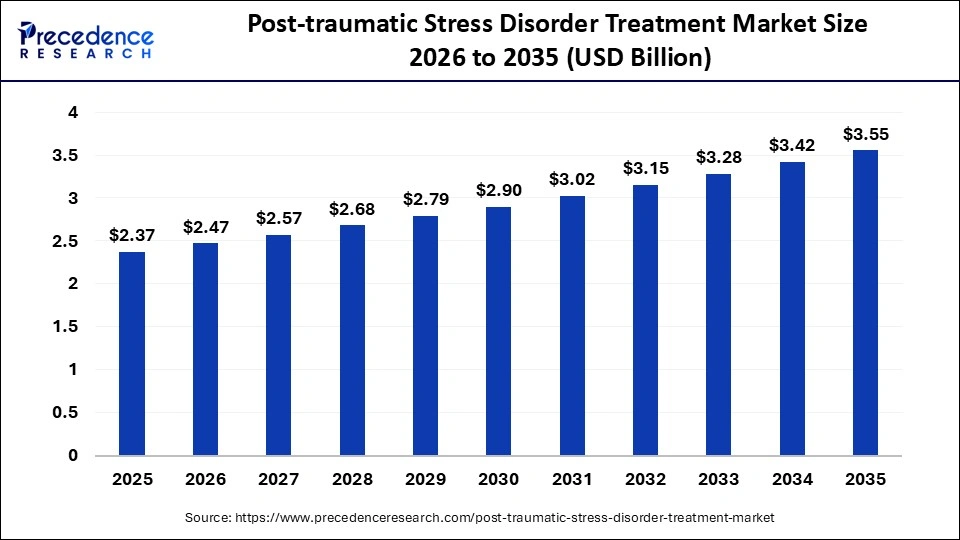
The use of artificial intelligence in the post-traumatic stress disorder treatment market is only one of the many industries where it has become a game-changer. AI has amazing powers, including the ability to process large amounts of information quickly and to make it easier to analyze intricate patterns and relationships. AI can completely transform mental healthcare by offering insights and solutions that were previously unattainable through traditional approaches, particularly in the field of mental healthcare, where comprehending complicated human behaviors and emotions is crucial. It is a game-changing tool that provides virtual therapeutic platforms, customized therapies, and sophisticated detecting techniques. It might increase access to healthcare, lessen stigma, and enhance the effectiveness of treatment.
The U.S. post-traumatic stress disorder treatment market size is exhibited at USD 1.03 billion in 2024 and is projected to be worth around USD 1.57 billion by 2034, growing at a CAGR of 4.28% from 2024 to 2034.
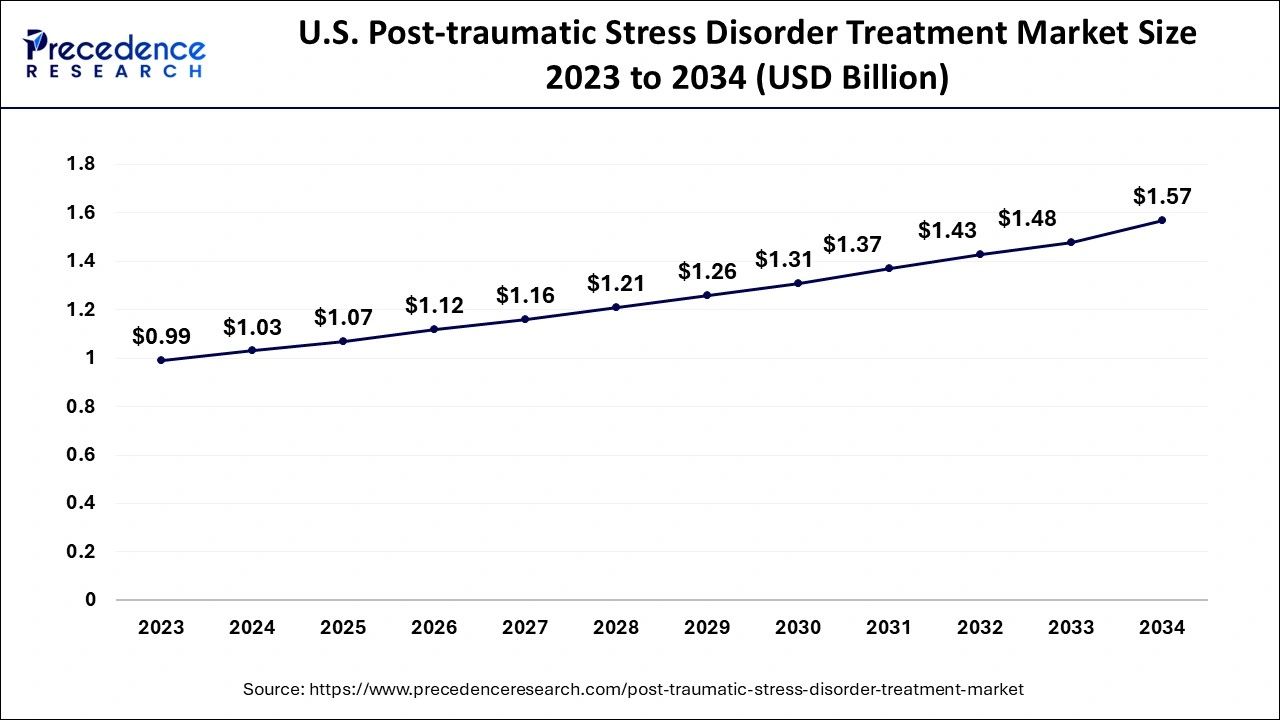
North America dominated the post-traumatic stress disorder treatment market in 2023. Veterans, active military personnel, and civilians are more likely to experience PTSD as a result of local and international armed conflicts (such as wars, military engagements, or internal instability). The psychological ramifications of the trauma endured under these circumstances are frequently long-lasting, requiring a variety of therapies, such as counseling, medicine, and rehabilitation.
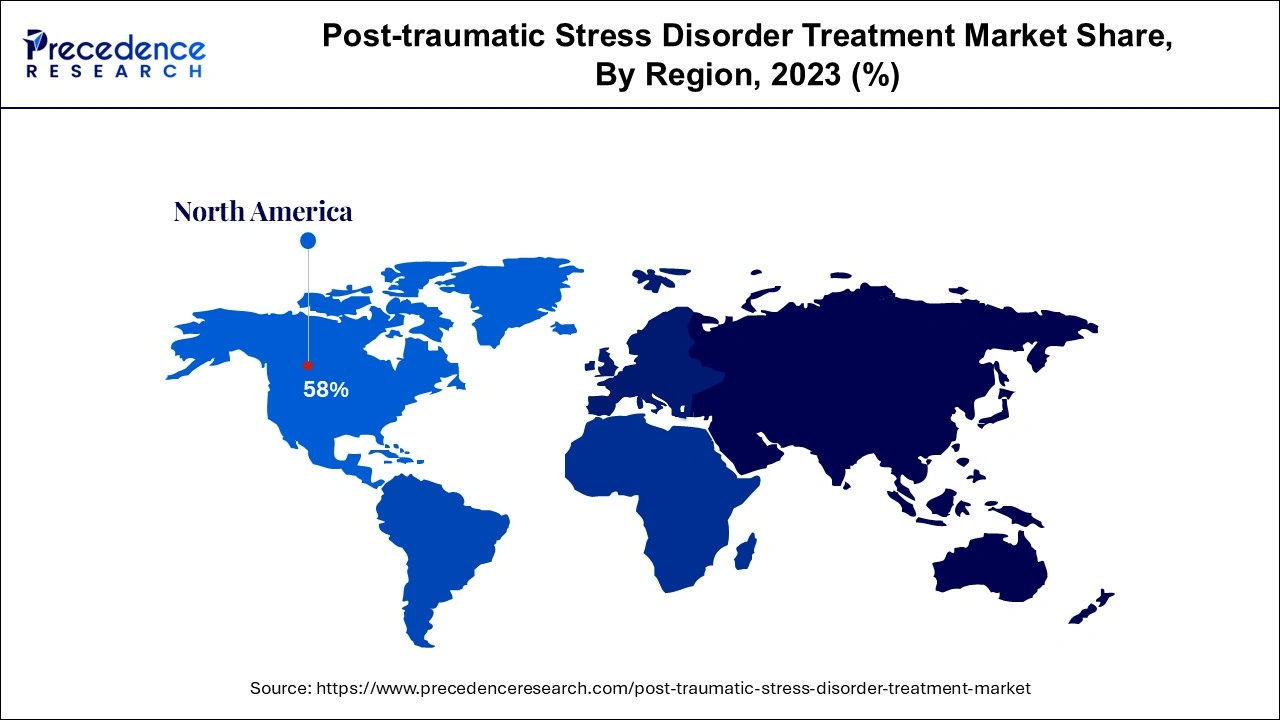
Asia Pacific is observed to host the fastest-growing post-traumatic stress disorder treatment market during the forecast period. Since Asia is a varied region, different cultural practices, and beliefs have an impact on how mental health issues are viewed and handled. Treatments that are adapted to certain cultural situations are made more acceptable and successful through personalized care. For example, combining contemporary therapy with traditional healing methods can improve patient participation and treatment plan adherence.
Several Asian governments are prioritizing mental health and funding individualized treatment programs. The industry is growing faster as nations like China, Singapore, and India integrate individualized care into their national health systems and increase mental health services.
The prevalent condition known as post-traumatic stress disorder (PTSD) is linked to severe discomfort and compromised functioning. PTSD has a substantial financial impact because of its impact on people's quality of life, productivity at work, and medical expenses. Since these expenses can be decreased by effective therapies, the market is essential to enhancing both economic stability and public health in general. The World Health Organization (WHO) reports that mental health conditions now account for a significant portion of the world's disease burden, with depression alone being the primary cause of disability worldwide.
| Report Coverage | Details |
| Market Size by 2034 | USD 3.42 Billion |
| Market Size in 2024 | USD 2.28 Billion |
| Market Size in 2025 | USD 2.37 Billion |
| Market Growth Rate from 2024 to 2034 | CAGR of 4.14% |
| Largest Market | North America |
| Base Year | 2023 |
| Forecast Period | 2024 to 2034 |
| Segments Covered | Drug Class, Demographics, Distribution Channel, and Regions |
| Regions Covered | North America, Europe, Asia-Pacific, Latin America and Middle East & Africa |
Importance of addressing mental health concerns
PTSD diagnoses have increased as a result of the growing frequency of wars, natural disasters, and other traumatic experiences in the post-traumatic stress disorder treatment market. There is a constant need for treatment solutions since victims of these incidents frequently need long-term mental health support. Globally, the COVID-19 pandemic has also made mental health issues worse. PTSD-like symptoms are currently plaguing a large number of people who have endured loneliness, grief, and the stress of frontline labor. PTSD care is becoming more widely available thanks to cutting-edge and scalable treatment alternatives offered by virtual reality (VR) therapy and AI-based mental health solutions.
Insufficient research on personalized medicine
The lack of trustworthy biomarkers to identify PTSD and forecast how well a patient will respond to treatments is a significant obstacle to personalized medicine in the post-traumatic stress disorder treatment market. A person's response to a specific treatment can be predicted using biomarkers, which are biological indicators (genes, proteins, or other quantifiable biological elements). Since there are no reliable biomarkers for PTSD, it is difficult to customize biologically based therapy. Because there are no biomarkers, doctors are forced to use clinical judgment and established diagnostic methods (such as questionnaires or interviews), which do not take into consideration the molecular underpinnings of PTSD.
Advancements in innovative therapies and technologies
One important post-traumatic stress disorder treatment market service, exposure therapy, has been transformed by VR technology. VR exposure treatment offers a novel and regulated method of lowering anxiety and fear reactions by submerging patients in a virtual world where they can safely face up to painful memories or events. Veterans, first responders, and those with complicated trauma histories will find it very helpful. Treatment approaches are changing as a result of new knowledge about the physiological effects of PTSD, such as immunological system failure and hormone imbalances. A comprehensive approach to recovery can be achieved by combining traditional therapy with complementary therapies, including yoga, acupuncture, and nutritional interventions.
The antidepressants segment dominated the post-traumatic stress disorder treatment market in 2023. Millions of people worldwide suffer from PTSD, including those who have served in the armed forces, have experienced abuse, or have been exposed to horrific situations. Because of their accessibility, effectiveness, and proven safety profile, antidepressants are frequently prescribed as the first line of treatment for both civilian and veteran populations. Government programs in nations with sizable veteran populations, like the U.S., place a high priority on treating PTSD with evidence-based methods. Because of their shown efficacy and affordability, antidepressants are commonly incorporated into these programs, increasing their market share.
The anti-anxiety segment is observed to grow at the fastest rate in the post-traumatic stress disorder treatment market during the forecast period. Campaigns and lobbying have raised awareness of PTSD as a mental health illness, which has increased the number of people receiving a diagnosis. Anti-anxiety drugs are increasingly being provided to patients as part of complete treatment plans as medical professionals become more proficient in diagnosing and treating PTSD.
The adult segment dominated the post-traumatic stress disorder treatment market in 2023. For individuals with PTSD, pharmacological treatments such as selective serotonin reuptake inhibitors (SSRIs) continue to be the first line of treatment. The FDA has approved drugs like paroxetine and sertraline, especially to treat PTSD. Adults are increasingly using evidence-based psychotherapies such as exposure therapy, eye movement desensitization and reprocessing (EMDR), and cognitive-behavioral therapy.
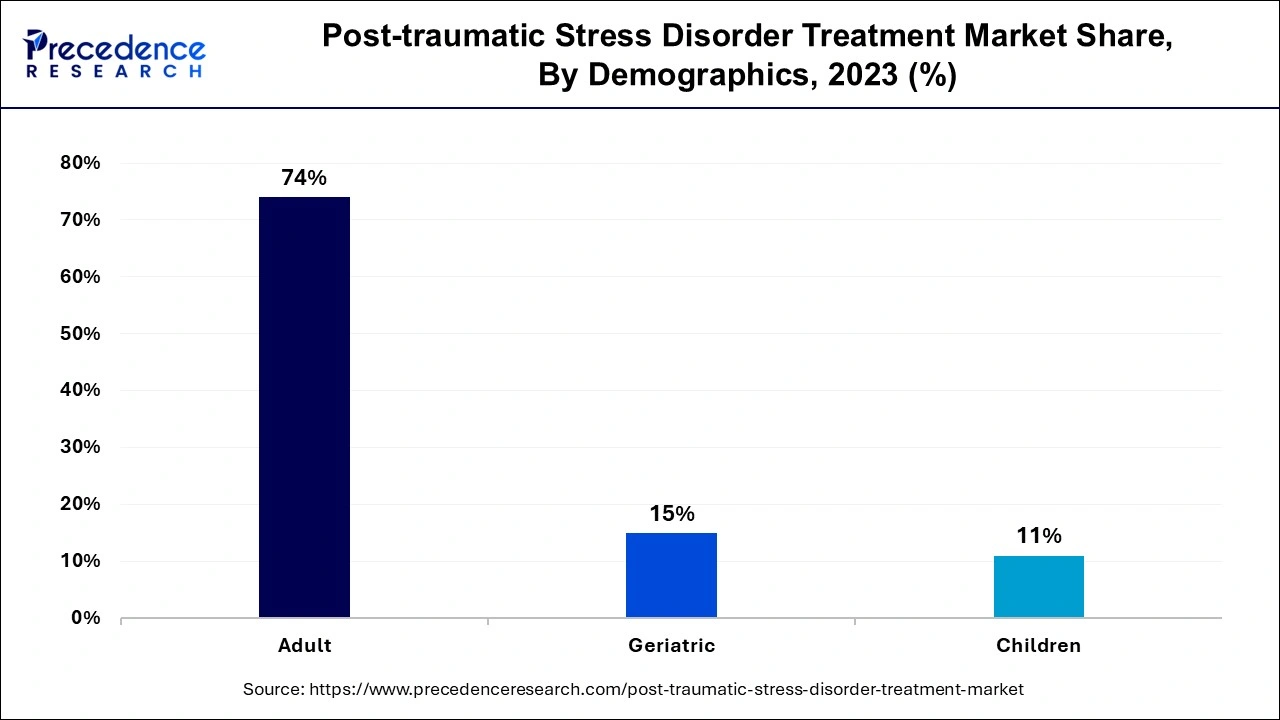
The geriatric segment will show lucrative growth in the post-traumatic stress disorder treatment market during the forecast period. Many older people have lived through major historical events, such as civil unrest, natural disasters, and wars. PTSD is especially common in veterans of previous battles, including World War II, the Korean War, and the Vietnam War. Diagnoses in this age range are further increased by the critical role that family members and caregivers play in recognizing PTSD symptoms and promoting medical care.
The retail pharmacies segment dominated the post-traumatic stress disorder treatment market in 2023. Campaigns to raise awareness of mental health issues mostly rely on retail pharmacies. Numerous pharmacies provide informational materials on PTSD and available treatments, which motivates people to get therapy and buy drugs from them. By incorporating telehealth services, some pharmacies are enhancing accessibility and convenience by enabling patients to visit doctors and fill prescriptions in one location.
The hospital pharmacies segment will grow rapidly in the post-traumatic stress disorder treatment market during the forecast period. Hospital pharmacies are prepared to carry and dispense a wide variety of specialty drugs needed to treat PTSD, such as anxiolytics, antipsychotic drugs, and antidepressant drugs (such as SSRIs like sertraline and paroxetine). Hospital pharmacies are well-equipped to handle and store these medications correctly, which are frequently necessary. Additionally, new drugs that need controlled settings for delivery and monitoring, such as ketamine for treatment-resistant PTSD, are accessible through hospital pharmacies.
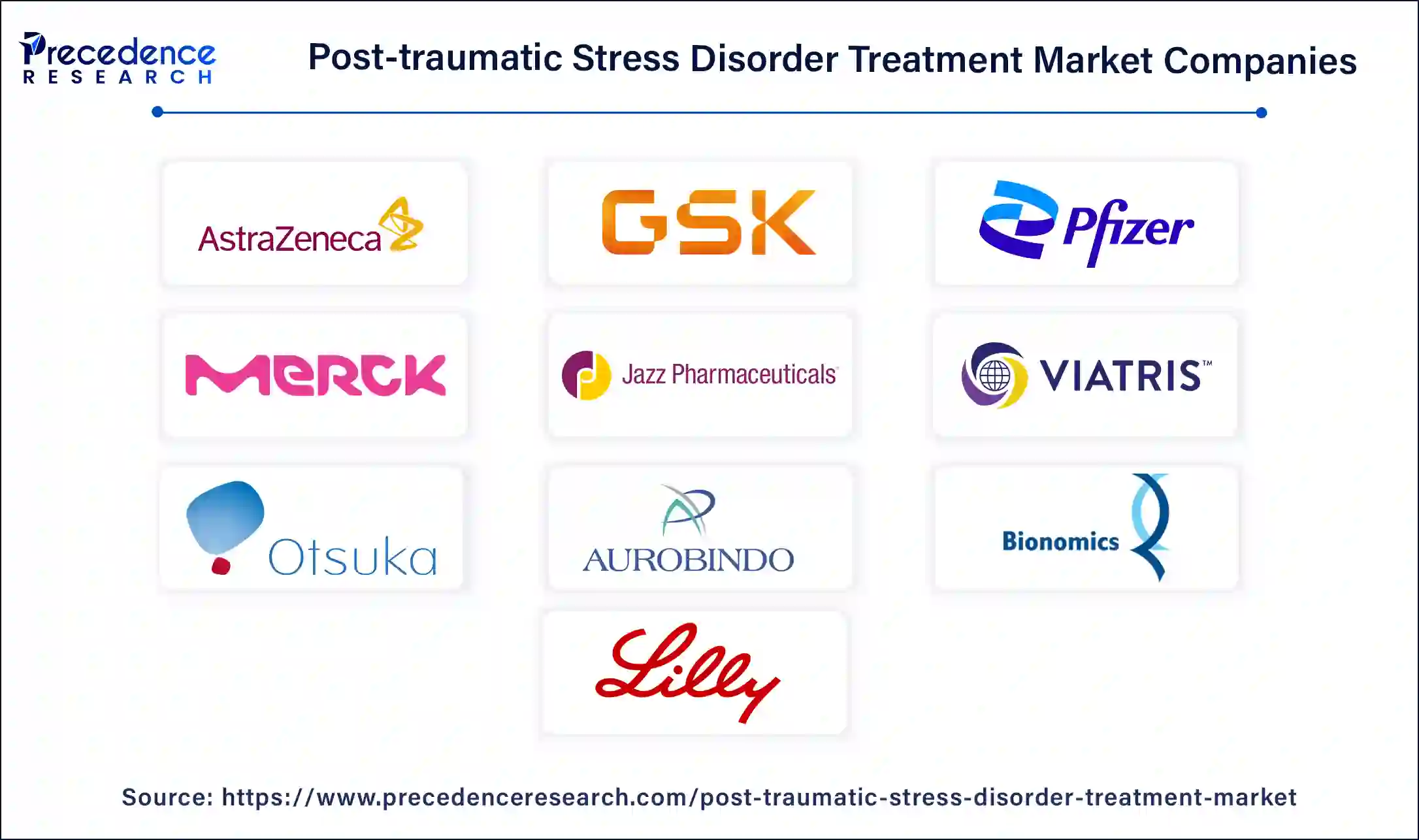
By Drug Class
By Demographics
By Distribution Channel
By Geography
For inquiries regarding discounts, bulk purchases, or customization requests, please contact us at sales@precedenceresearch.com
No cookie-cutter, only authentic analysis – take the 1st step to become a Precedence Research client
February 2025
January 2025
November 2024
June 2024